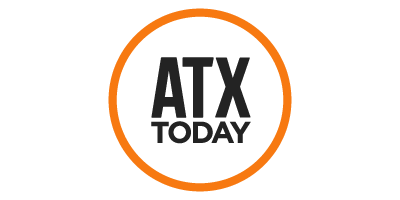This is a part of our Q+A series. Know someone we should interview? Nominate them here.
Angel Flores is an Austin-based powerlifter, transgender rights advocate, and weightlifting coach at South Austin’s Liberation Barbell Club. Oh, and if you’re wondering where you’ve heard her name before, you might be thinking of the Queer Eye episode she starred in last month.
Since that episode aired (if you haven’t seen the show’s season in Austin, read our recap here) the 23-year-old has risen into the public eye and brought visibility to the transgender community. I sat down with her at South Congress’ Bennu Coffee to learn what that experience has been like.
How did you get into powerlifting?
Everybody sees Angel as a powerlifter, but I was doing Olympic weightlifting before transition. I did that for two years, and competed three or four times. It was a lot of fun. But really, just like all the dysphoria and insecurities were holding me back. I wasn’t eating. I wasn’t consistent with my training. I had more anxiety attacks, and I then had good days. So, it wasn’t until July 2020 I finally started the hormones and started transitioning. And that’s when movement actually truly became a part of me. Like, that was the day that these things were just stuck with me, and they’re never going away.
With that being said, though, those six months following taking the hormones and starting the process, it was really rough. So, I could power clean 100 kilos, the day before hormones, right? So like, 225 I could just throw it on my shoulders, and then two days after I couldn’t. It was instant. It was fast. I used to snatch 94 kilos. I haven’t gotten above 84 in a year. It’s dropped a lot, 20, 25 pounds, 30 pounds. It’s really just demoralizing to just go through this whole process of like, ‘Oh, I was doing so good.’ And now all the numbers are dropping straight down.
So, January 1, 2021. I had just previously had a conversation with my current coach Vinny, who was on the [Queer Eye] episode. … He got real emotional and he texted me, and he was like, ‘Look, there’s a new third category with USA Powerlifting. I understand it’s not your favorite thing. I understand that it’s not recognizing you as you. However, you’re an athlete. You need competition. This is your opportunity to compete. And I think you could switch and maybe make a difference in the sport.’ And I was like, ‘Okay.’
And really it was for him. I almost quit. … And I was sitting there and I was like, ‘I don’t wanna do this anymore.’ And that switch really just saved the whole thing.
What made you decide to keep trying, after that experience?
For me, it was because movement has always been fulfilling for me. I’ve always found a way to be good at it.
When I was growing up, for the first 10 years of my life, I was the chubby, unathletic kid. Then, my dad forced me to play all these sports. … Then, becoming a teenager and realizing that I can move, and I’m actually kind of good at it, it was kind of just like, ‘Okay, now what’s holding me back.’ And by then it was, ‘Okay now transition is holding me back.’ By 2020, it was the anxiety, depression .... And then post-transition, it was about getting to the point where I felt comfortable doing what I love, however I want to do it, feeling comfortable wearing what I want, and calling myself what I want, and acting the way I want in the space that I belong. You know, it truly made me feel like I could do anything.
There’s this argument that’s been used like, oh, like, what about the trans women that played a sport before and also played it after, and like did horrible before and better after? And I say, you can only truly perform well if you’re not blocked. You can’t have a mental block. The athlete’s mental game is 90% of the sport, movement is only 10%. … And for every single trans person before transition, there’s a mental block.
What else do you want people to know about transgender athletes?
I think that a lot of people go into it with this kind of picture of what transition looks like. And I think because of how we’ve been conditioned to view athletes in general, we see every single trans athlete like this huge, burly, muscular, testosterone, assigned male at birth person.
The reality is that we’re just normal people who are growing up with these issues. We don’t have any inherent athletic advantage. … Essentially, for us, after a year on hormones, all that’s left is just our stature, right? How tall we are, how long our limbs are. … After the hormones, I have to put the same amount of work in as all of my cisgender peers. So in my mind, if I have to put the exact amount of work in to reach the same levels as these [other] girls, what’s the problem?
For me, it’s saying, ‘Well, I have a voice. I have a support system that allows me to have a voice. I have people behind me and organizations behind me that genuinely believe in what I’m doing and what I’m saying.’ And for me it’s about you know, showing the world there’s nothing here that’s dangerous or, or indestructible or unwinnable. I’m not gonna dominate, I lose just like every other girl. … We’re just humans trying to exist alongside each other and compete against each other and have fun with each other. And ultimately, if we can look at each athlete as an individual, instead of just as a whole, we can find a place for every single athlete where they want to be.
How did you find your gym, Liberation Barbell Club?
Liberation Barbell Club is the most inclusive gym in Austin, hands down. … We’ve built this amazing community that really just accepts anyone on any background, any training, any training background, anything really — just come and be you, and that’s the biggest thing.
Especially for people like trans, queer people in the space, we don’t really find friendly places for us. … Would I feel necessarily safe among all this gym bro culture? No, definitely not, especially as a strength athlete.
[I found Liberation Barbell Club] actually a week after I got on hormones, I was scrolling through Instagram and an ad just popped up. I sent an email, I was like, ‘Look, I’m a trans athlete. I just started hormones.’ And [the gym owner messaged] me back instantly. She was like, ‘I’ll see you tomorrow.’
How did you first get involved with Queer Eye?
Essentially it started with the gym. [The gym owner] was like, ‘If anybody deserves this, it’s this girl who’s worked so hard to not only grow the community and stuff but also grow herself.’ And she told me that directly, but she didn’t tell me that she nominated me.
We actually were going through a rough time. It was April 2021, our old apartment had a sewage leak, it was awful. So, we were basically homeless for a little bit, running around trying to find a place to live. I was switching my hormone regimen up at the same time, so I was between doctor’s appointments. And my boss calls me and she’s like, ‘Hey, you might get a call from a Netflix producer in an hour.’
And from there, it’s just like, Netflix basically dates you. The producers come out and they meet you. My favorite story is, I was sitting with the two of the executive producers … and I’m like, enjoying this great meal that we’re eating, while telling my story, just rambling along. I look up and [one of the producers is] stoically wiping away her tears, but [the other one] is like, bawling, crying. I was like, ‘Oh, I guess the story impacts people, or something.’
It felt like they wanted to illustrate what I do and what I have done, and what the future could hold for people like me.
What was the filming process like?
Filming is just a week. And that first day, they surprise you. I was in the gym and I was chilling out lifting. I thought they were filming cool training footage. Then I looked up in the middle of my set, and I’m like, ‘Those cameras aren’t looking at me.’ And then the big truck pulls around the corner. They whisk you away and you’re away from your loved ones for the whole week. … You’re just spending the whole day just filming, filming, filming. Me and [Jonathan Van Ness] spent nine hours in that chair together.
They actually switched up the pace of the episode. They usually in the episodes do all the emotional, foundational stuff first, and then the makeover second. For this, they wanted to illustrate the happiness and how it spreads to other people.
Now, I have parents, and kids, and parents of trans kids who are emailing me, DMing me, saying, ‘My child has never had a role model, my child has never seen a relationship like that on television with a father and his trans daughter. I saw my child’s shoulders relax, and I saw how happy they were seeing somebody like them on screen.’
What was it like watching the episode when it aired?
I’ve seen it twice. It’s a lot. I felt the joy all over again. Really, it was just like reliving all those amazing moments … I still feel every single emotion that I felt turning around in that chair.
And now I get to do the things, take photoshoots and further show myself that I am worthy of doing what all these other stars are doing. That was my fear going into it, was like I’m not pretty enough, feminine enough, or this or that compared to all these other people. But now, with Queer Eye and with these differences and finding this new confidence, it’s really me looking at the world and saying, ‘No, the world isn’t worthy of me.’
What’s it been like rising into the public sphere since then?
Wild. A whirlwind. I try and stay humble and literally, sometimes I have to sit there and be like, ‘This is absurd.’ Because it’s crazy how I can make so many connections with a wide variety of people, and really speak to a wide community.
I still feel like I’m just talking, but for somebody to come to me and be like, ‘You’re changing how people look at the world, how people look at other people,’ that’s, again, that’s just impossible. I never imagined it.












